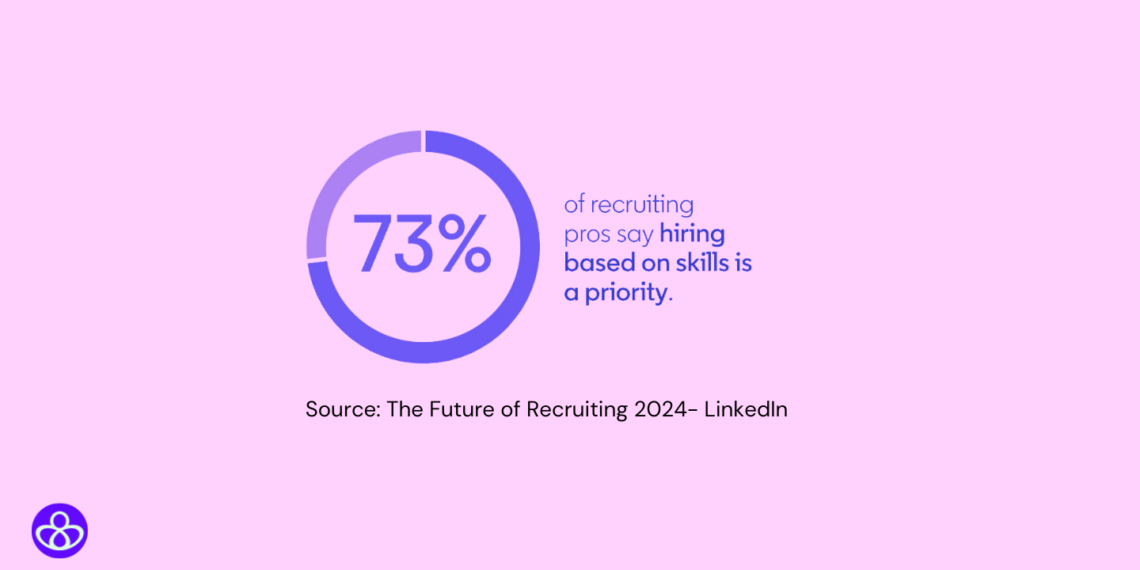Table of Contents
Recruiters and job seekers match not on jobs but rather on frustration. Recruiters are desperate to find the right candidates for open roles. At the same time, millions of degree-holding job seekers are searching with anguish for employment opportunities. The mismatch is clear.
A phenomenon has been forming that is termed the “death of the degree.” It is born out of the fact that static college degrees are not keeping up with the mushrooming of digital tools, which require never-ending new and evolving skills. Hence, on-demand learning platforms came to the rescue and might have helped smooth the transition to the upward-trending skills-based hiring.
ZipRecruiter surveyed 2,000 recruiters; 72% of the respondents said they now practice skills-based hiring, prioritizing skills over degrees, despite acknowledging some resistance to this major change. In line with this trend, job postings requiring a bachelor’s degree fell 10% between 2022 and 2024, whereas job postings offering candidates training rose 31%. In addition, 23% of employers say they could not fill vacancies in the last six months due to the shortage of the right skills. These include not only technical skills but also, in a big way, soft skills stressing work ethic and enthusiasm for the role. Three skills employers say are most lacking in candidates are:
- Time management (47%)
- Professionalism (43%)
- Critical thinking (39%)
New Ways to Assess Skills
Forty-three percent of respondents to the ZipRecruiter survey say they are using online platforms for skills assessment to measure candidates’ competencies, rather than relying on degrees or certificates alone. They also mentioned that they are prepared to make investments in candidates who possess the right soft skills, utilizing new employee training and development programs. When they were asked about AI, 57% of them say they are looking for candidates with AI skills. According to the study, this skills-based method benefited 36% of job seekers who got a new job after learning a new skill, taking an online course, or gaining a new certification.
The Paper Ceiling Is Tearing
To understand the prevalence of skills-based hiring, Lightcast and BCG examined 20 million job postings and came up with these findings:
- 54% of college graduates do not work in their original field of study, and the jobs that will be available in five to ten years do not exist today.
- Candidates who are self-taught or gained skills through experience are becoming a major force in the labor market: 70 million people in the U.S. can be categorized as “STARs,” which stands for workers who are “Skilled Through Alternative Routes.”
In the war for talent, recruiters are forced to widen their pool to discover gems in a changing workforce. In search of company-wide super-performance, they shifted from “degree and pedigree” to “will and skill.” And in the process, they are tearing down the paper ceiling that has capped the potential of millions of individuals without degrees for decades.
The U.S. leads this shift in the public and private sectors. Dell, IBM, Apple, Amazon, Meta, Tesla, Alphabet, Microsoft, Ernst & Young, Accenture, and Bank of America are just some names that have already embraced skills-based hiring. Since 2021, ten U.S. states eliminated the degree requirements for many government roles, especially for jobs related to emerging technologies.

Skills-Based Hiring Is Worthwhile but Needs Know-How
The American Psychological Association affirmed decades ago that a hire based on skills is five times more likely to perform well. The BCG interviews support this affirmation. Several interviewees mentioned that skills-based hires work harder and are more motivated. They also bring with them specific experiences and abilities such as presentation skills, problem-solving skills, and overall maturity. Companies seeking to widen their hiring lens must learn how to implement this new recruiting approach.
Know the skills they are hiring for: Tradition can be hard to forgo. So, employers must ask themselves: What are the skills, and does it matter how they are acquired? A case study on this is Goldman Sachs, which recently began to apply a “skillset recruiting” approach, where candidates apply to specific skill areas, not jobs, then participate in skill testing and get referred for the most relevant jobs based on their skill sets. Companies hiring based on skills must have a deep understanding of those skills and dynamically forecast future skill profiles.
Learn how to assess for skills: Instead of degrees, companies now look at micro-credentials such as learning badges, recommendations, or completed projects. They also test candidates by asking them to demonstrate skills such as writing code, participating in a trial period, or testing skills via simulation, including leveraging generative AI for these real-world problem simulations.
Keep employees’ skills updated: For that, promotions, internal moves, and talent decisions should be based on skills. A case study for this is Novartis’s AI-powered internal talent marketplace, which uses information on employees’ skills and goals to predict, match, and offer roles and projects. This requires a culture of talent-sharing and not talent-hoarding, where everyone in the company is enabling skills-based flexible career paths.

Adding AI to the Mix to Make Magic
Given the need for evolving skills and more diversity in the workforce, the doors to less traditional hires are opening. In the Future of Recruiting 2024, LinkedIn surveyed 1,453 recruiting professionals in six languages across 23 countries about AI and skills. In recruiting, the use of generative AI emphasizes the top three soft skills that survey respondents said will become more important for recruiters over the next five years:
- Communication (77%)
- Relationship building (72%)
- Adaptability (63%)
How Can Employees Front-Run the Future of Work
These various surveys underscore a significant global shift in hiring where employers are increasingly giving greater importance to technical and hard skills wrapped in dignifying soft skills such as work ethic, enthusiasm for the job, communication, human relations, adaptability, and problem-solving, topped with AI proficiency over traditional educational credentials. Moreover, the World Economic Forum’s (WEF) report estimated that by 2025, 85 million jobs may be displaced worldwide due to automation and artificial intelligence (AI). At the same time, 97 million new jobs are expected to emerge.
These new roles will likely be in areas such as data analysis, AI and machine learning, big data, digital marketing, and process automation, among others. These new jobs will require skills such as critical thinking, problem-solving, and self-management. This transformation calls for reskilling and upskilling to remain coveted in a job market influenced by AI and other technologies.
If you enjoyed this article, please check out how to get the most out of Growth Hacking in Digital Marketing here.



